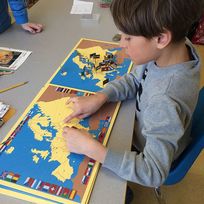Elementary I (ages 6 through 9)

DESCRIPTION
This Course prepares individuals to teach children 2 1/2 through 6 years of age in a period of 24 weeks of lecture hours and 24 weeks of externship/internship. It consists of two units, Unit A: Pedagogical Theory and Unit B: Externship/Internship, starting the first week of January and ending the last week of June or starting the first week of August and ending last week of January. Both units of the Course need to be completed in no more than one year to qualify for the certificate of completion. The Educational level of this course is that of undergraduate, post-secondary or continuing education.
CURRICULUM
The Elementary I Course consists of approximately 200 lecture hours, 1000 internship hours consisting and 860 supervised practicum hours at an approved school and the writing of designated assignments of presentation. Total hours 2060. Please note: The lecture hours as well as the supervised practicum imply the presence of an instructor.
The Elementary I Course curriculum comprises an intensive study of Montessori Educational Psychology, including at least 40 hours of Supervised Practicum with Montessori materials, in addition to the lecture-demonstrations. The presentations carried out during the course apply to the following academic subjects:
OBJECTIVES
The objective of the Elementary I Course is to prepare students for careers in Montessori teaching within the specified child range of 6 through 9 years of age. In order to meet this objective, students will gain knowledge in the areas of Montessori philosophy and psychology, purposes, materials, presentation of lessons, verbalization skills and principle and techniques that prepare the student to manage a class successfully. Upon completing this program, the Elementary I Lead Guide shall be able to:
Demonstrate knowledge of human development and education:
Demonstrate Knowledge, application, and analysis of the theoretical /philosophical base upon which
Montessori early-childhood education programs have been and currently are being developed. This includes awareness of the child’s spirit and moral development.
Plan programs that meet the individual needs and interests of children, which are appropriate to their development, socio-cultural background, and experience level, based primarily on the Montessori philosophy and didactic apparatus:
Evaluate objectives, children’s individual growth. Learning and programs:
Design and evaluate curriculum materials and resources appropriate to children with varying abilities and cultural backgrounds.
Develop parental interest and involvement.
Direct entire classroom program and demonstrate an awareness of administrative responsibilities regarding:
Develop awareness of professional growth opportunities, such as Montessori and other educational conferences, publications, organizations, and resources.
This Course prepares individuals to teach children 2 1/2 through 6 years of age in a period of 24 weeks of lecture hours and 24 weeks of externship/internship. It consists of two units, Unit A: Pedagogical Theory and Unit B: Externship/Internship, starting the first week of January and ending the last week of June or starting the first week of August and ending last week of January. Both units of the Course need to be completed in no more than one year to qualify for the certificate of completion. The Educational level of this course is that of undergraduate, post-secondary or continuing education.
- UNIT A – PEDAGOGICAL THEORY - This part of the Course consists of lecture demonstrations weekly. The Montessori materials and curriculum exercises are presented in a step-by-step, sequential order of demonstrations according to the academic subjects covered in the course. This is a period of 24 weeks for either first or second semester in the year.
- UNIT B – EXTERNSHIP/INTERNSHIP - To acquire total understanding and first-hand experience of the Montessori Method, the student-teacher is required to spend a minimum of 1000 hours in externship/internship. During these hours, the student-teacher will be asked to aid the functioning of the classroom as an assistant teacher would, thus gaining an invaluable practical experience in classroom management. Staff meetings for class-management instruction are a mandatory part of the student’s externship/internship. Please note that the Pedagogical Theory / Lectures take a period of six months. The student-teacher has another five months to comply with supervise practicum hours.
CURRICULUM
The Elementary I Course consists of approximately 200 lecture hours, 1000 internship hours consisting and 860 supervised practicum hours at an approved school and the writing of designated assignments of presentation. Total hours 2060. Please note: The lecture hours as well as the supervised practicum imply the presence of an instructor.
The Elementary I Course curriculum comprises an intensive study of Montessori Educational Psychology, including at least 40 hours of Supervised Practicum with Montessori materials, in addition to the lecture-demonstrations. The presentations carried out during the course apply to the following academic subjects:
- LANGUAGE (JE 201) - The Study of Reading, Writing, Sentence Building, Study of Words, Grammar Analysis, Composition and Elements of the Sentence. Lecture, 30 hours; Lab, 120 hours; Externship, 24 hours.
- MATH (JE 202) - The Study of the Decimal System, four Basic Operations, Prime Numbers, Operations with Fractions, Study of Powers, Divisibility, Memorization of Mathematical Facts, Introduction to Algebra and Integers. The Metric System, Preparation for Square Root, etc. Lecture, 36 hours; Lab, 130 hours; Externship, 36 hours.
- GEOMETRY (JE 203) - Plane figures, Perimeters, Study of Areas, Equivalences, Study of Lines, Angles, Study of Polygons, Study of Solids, Study of the Circle and its Lines. Lecture, 31 hours; Lab, 130 hours; Externship, 24 hours.
- CULTURAL SUBJECTS (JE 204) - Study of the Capitals and Countries of the world, Study of Flags, Land Forms, Classification of Plant Kingdom, classification of Animal Kingdom, Time Line of Life, History of the Earth, Human History and Civilizations. Lecture, 48 hours; Lab, 120 hours; Externship, 36 hours.
- ARTISTIC EDUCATION (JE 205) - Activities related to Painting, Drawing, Tracing, Music Appreciation and Education with the Montessori Bells are incorporated into the environment during the school year and events. Lecture, 18 hours; Lab, 120 hours; Externship, 3 hours.
- CLASSROOM MANAGEMENT (JE 206) - Pedagogical Principles and Classroom Management Techniques as well as verbalization skills needed to obtain a class environment conducive to learning and self-discipline. Lecture, 17 hours; Lab, 120 hours; Externship, 14 hours.
- MONTESSORI PSYCHOLOGY AND PHILOSOPHY (JE 207) - This course is designed to provide an intensive practical and comprehensive study of Dr. Maria Montessori’s method of education. It also includes the study of the different stages of development and the child’s psychological characteristics from ages birth to 12 years of age. Lecture, 20 hours; Lab, 120 hours; Externship, 3 hours.
OBJECTIVES
The objective of the Elementary I Course is to prepare students for careers in Montessori teaching within the specified child range of 6 through 9 years of age. In order to meet this objective, students will gain knowledge in the areas of Montessori philosophy and psychology, purposes, materials, presentation of lessons, verbalization skills and principle and techniques that prepare the student to manage a class successfully. Upon completing this program, the Elementary I Lead Guide shall be able to:
Demonstrate knowledge of human development and education:
- Interpret child development and early education concepts to other staff, parents, and community.
- Plan for continuity of learning experience for children in the certification age range.
Demonstrate Knowledge, application, and analysis of the theoretical /philosophical base upon which
Montessori early-childhood education programs have been and currently are being developed. This includes awareness of the child’s spirit and moral development.
Plan programs that meet the individual needs and interests of children, which are appropriate to their development, socio-cultural background, and experience level, based primarily on the Montessori philosophy and didactic apparatus:
- Demonstrate ability to assess children’s learning needs, including special needs, through a variety of vehicles (i.e., observation, case studies, test, development scales, and classroom products).
- Develop a suitable match between assessment and learning activities provided.
- Demonstrate knowledge of the teaching of language arts and reading.
- Demonstrate knowledge of the teaching of sensory-motor activities.
- Demonstrate knowledge of the teaching of mathematics.
- Demonstrate knowledge of the teaching of art, music, movement, history, geography, science, and Montessori ideas on cosmic Education.
- Demonstrate knowledge of varied learning styles.
- Demonstrate knowledge of environmental design and preparation.
- Provide opportunities for choice, problem-solving, decision-making, and responsibility for learning on the part of the child.
- Demonstrate a broad repertoire of teaching strategies (i.e. Structuring environment, using Montessori and other manipulative material for exploration, demonstration, and concrete models; modeling behavior; using verbal strategies such as inquiry, explanation, imitation, illustration, and dramatization, and incorporating appropriate technology)
- Demonstrate ability to plan and implement group activities.
- Develop organizational and classroom management procedures to facilitate growth and learning.
- Demonstrate and understanding of Montessori philosophy and practice its continuity.
Evaluate objectives, children’s individual growth. Learning and programs:
- Demonstrate consistency between stated objectives and methods of evaluation ( i.e., assessment of cognitive, affective, and psychomotor development).
- Demonstrate the knowledge of age-appropriate evaluation measures.
- Develop and use a variety of appropriate record-keeping and evaluation processes.
- Interpret results of evaluative measures.
- Prepare professional reports.
Design and evaluate curriculum materials and resources appropriate to children with varying abilities and cultural backgrounds.
- Evaluate and select prepared curriculum materials.
- Develop original materials to meet the needs and interests of the children.
- Demonstrate knowledge of the rationales of Montessori and other curriculum materials.
- Demonstrate knowledge of continuum within the Montessori curriculum materials.
Develop parental interest and involvement.
- Demonstrate knowledge of community served.
- Demonstrate ability to articulate program.
- Demonstrate communication skills appropriate in parent conferences, non-judgmental listening, and interactions with others.
- Develop awareness of community resources for referral, enrichment, programs development and implementation.
Direct entire classroom program and demonstrate an awareness of administrative responsibilities regarding:
- Minimum standards required by health/education/welfare/ codes and legal liabilities and issues.
- Acquisition of supplies, maintenance of equipment, budget planning.
Develop awareness of professional growth opportunities, such as Montessori and other educational conferences, publications, organizations, and resources.
